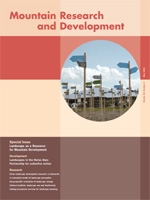Listening to the Mountains by Robert E. Rhoades. Dubuque, Iowa: Kendall/Hunt Publishing Company, 2007. xx + 184 pp. US$ 44.45. ISBN 978-0-7575-4635-8.
Amidst an ever-increasing body of scientific literature on mountain research, Robert Rhoades' collection of writing on a rich life of mountain experiences and encounters with indigenous mountain people is refreshing and touching. It is a grateful recognition of the heritage and wisdom of mountain people across the world by this reputed anthropologist and development specialist. In the face of global assimilation, challenges, and crises facing mountain communities, Rhoades argues that “we need to listen to the mountains and their inhabitants for guidance as the heritage of mountain experiences has created a parallel wisdom and alternative paths to sustainable development” (p ix). This collection of Rhoades' journeys in, and writings about, the highlands of North America, Central America, Kenya, the Andes, the Alps, the Sierra Nevada, the Taurus, the Himalaya, the Hindu Kush, and other Asian mountains spans a period of over 45 years.
The volume offers an intriguing blend of scientific writing, vivid field experiences and autobiographical accounts, and is organized in three principal parts. The first section, entitled “From Flatlands to Highlands,” relates to the “flatlander's” first fascination and experiences with the Himalaya and the Alps. As a young Peace Corps volunteer in Nepal, Rhoades became quickly aware of “flatland and lowland biases” that work to the detriment of mountain cultures and economies. During his visit to Switzerland in the early 1970s, he also discovered that “survival in the mountains has generated similar adaptations in geographically separated areas due to the vertical terrain, climate and socioeconomic vulnerability and marginality” (p xi). While this statement might still have had some merit in the 1970s for some remote parts of the Alps, pervasive and profound development and modernization processes have deeply transformed the cultural landscape of the Alps and its populations during the past decades. In this evolution, many traits of a traditional mountain identity and autonomy have weakened or disappeared, but so have the former socioeconomic vulnerability and marginality. A third major mountain realm, the tropical Andes, became an early focus of Rhoades' experience during his work at Peru's reputed International Potato Center. At this institution, he contributed to the development of improved seed varieties and crop storage systems. The first part of the book is completed by an early, originally unpublished paper on “Agro-Pastoral Strategies in High Mountains,” and a more recent comparative paper entitled “Mountains and the Human dimension.” Here the author reinforces his strong plea that “mountains and mountain people deserve a central place in the global sustainable development plan” (p xiii).
The statement above serves as a framework for Part II of the book, titled “Valuing Mountain People's Perspectives and Knowledge.” This has been a guiding ethical and scientific principle throughout Rhoades' distinguished career. In 4 loosely connected chapters, he recognizes “the long-term adaptations and rich indigenous knowledge of mountain farmers” (p xiii); he also reports on the so-called “Foxfire philosophy” of Appalachian culture based on the wisdom and the ways of life of elderly mountain people. In the chapter “Bringing Mountain People Together,” he expresses his concern that the voices of mountain people in isolation would get lost without a “cross-fertilization” between mountain communities fostered by effective mountain-to-mountain programs. In the last chapter of Part II, “Participatory Watershed Research and Management,” he outlines major so-called “land mines” on the road to effective management, together with suggestions to overcome these obstacles.
Part III deals with “Sustainable Mountain Futures.” It is introduced by a slightly modified paper—“Agenda for Sustainable Mountain Development”—originally published in 1997 by Jack Ives, Bruno Messerli, and Rhoades, in anticipation of the International Year of Mountains (2002). This chapter is followed by Rhoades' personal account on the disappearance of the Cotacachi glacier in Ecuador, which has had a significant spiritual and economic impact on the local indigenous community. Unrelated to this paper is the following “semi-autobiographical essay on Maoism in Peru and Nepal.” The concluding paper of the book, “Whither Montology?” makes a strong case for the introduction of “montology” as a recognized transdisciplinary mountain science.
This 184-page collection of writings is richly illustrated with 26 black and white photographs, and a rather inconspicuous front cover color photo. Unfortunately, the barely satisfactory technical quality of a number of the pictures detracts a little from the overall attractiveness of the book. Also, the value of the book would have been greatly enhanced by a larger number of relevant maps (there is only one map of the author's mountain visits), tables (2 tables on models of mountain agriculture and on 19th century accounts of the Cotacachi glacier) and diagrams (none in the book). The many references at the end of each chapter—most in English, some in Spanish, but only 1 (with faulty spelling) in German—are very helpful, but it is unfortunate that the vast body of relevant French literature has been ignored.
Listening to the Mountains is a very personal testimony of Rhoades' affection for mountains and mountain cultures. It reveals intriguing glimpses into his many field experiences in diverse mountain realms, as a keen and admiring observer, and as a person who is committed to mountain people and their wisdom. Yet, at the same time, Rhoades has always been engaged in offering his ‘Western’ scientific knowledge to indigenous populations and in building genuine partnerships based on participatory development efforts. The book is an inspiring document of respect and gratitude to mountain people; for the community of montologists and mountain aficionados, it is a fascinating and highly enriching read.





